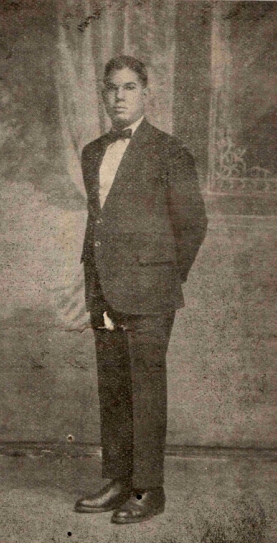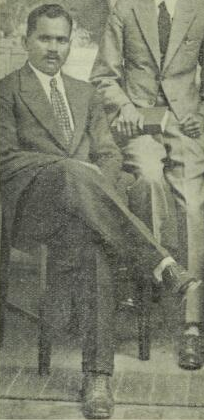
The Legislative Council of Fiji was the colonial precursor to the present-day Parliament, which came into existence when Fiji became independent on 10 October 1970.

The Colony of Fiji was a Crown colony that existed from 1874 to 1970 in the territory of the present-day nation of Fiji. London declined its first opportunity to annex the Kingdom of Fiji in 1852. Ratu Seru Epenisa Cakobau had offered to cede the islands, subject to being allowed to retain his Tui Viti title. His demand was unacceptable to both the British and to many of his fellow chiefs, who regarded him only as first among equals, if that. Mounting debts and threats from the United States Navy had led Cakobau to establish a constitutional monarchy with a government dominated by European settlers in 1871, following an agreement with the Australian Polynesia Company to pay his debts. The collapse of the new regime drove him to make another offer of cession in 1872, which the British accepted. On 10 October 1874, Britain began its rule of Fiji, which lasted until 10 October 1970.

Ambalal Dahyabhai Patel, better known as A.D. Patel, was an Indo-Fijian politician, farmers' leader and founder and leader of the National Federation Party. Patel was uncompromisingly committed to a vision of an independent Fiji, with full racial integration. He was one of the first to advocate a republic, an ideal not realized in his lifetime. He also advocated a common voters' roll and opposed the communal franchise that characterized Fijian politics.

Fiji was an independent state from 1970 to 1987, a Commonwealth realm in which the British monarch, Elizabeth II, remained head of state as Queen of Fiji, represented by the Governor-General. The state was the successor of the British Colony of Fiji which was given independence in October 1970 and it survived until the Republic of Fiji was proclaimed on 6 October 1987 after two military coups, at which time Queen Elizabeth II was removed as head of state. During this time, Fiji's highest court was the Judicial Committee of the Privy Council, which was above the Supreme Court of Fiji in the Fijian judicial system.

Pt. Vishnu Deo OBE was the first Fiji born and bred leader of the Indo-Fijians. From his initial election to the Legislative Council in 1929 to his retirement in 1959, he remained the most powerful Indo-Fijians political leader in Fiji. He was a staunch supporter of Arya Samaj in Fiji and also the editor of the first successful Hindi-language newspaper to be published in Fiji.
Kunwar Bachint Singh was an Indo-Fijian teacher and politician. He arrived in Fiji in 1927 as a teacher for the Arya Samaj but his association with Vishnu Deo led him to play an active role in aggressively promoting the Arya Samaj and finally into politics. He was elected into the Legislative Council as a protégé of Vishnu Deo but after the election took an independent stance opposed to the wishes of the majority of the Indo-Fijians. He supported nominated rather than elected representation, actively supported the war effort and even attempted to set up a farmers union opposed to a number of existing unions. The Government rewarded him for his loyalty by nominating him into the Legislative Council three times, appointing him as a Justice of the Peace and as the first Indo-Fijian member of the Executive Council.

Chandersen Chattur Singh was an Indo-Fijian politician. He caused a major sensation in the 1937 elections when he defeated A. D. Patel, a well known lawyer and political ally of Vishnu Deo.
Ayodhya Prasad Sharma was an Indo-Fijian farmers' leader and politician. He formed the most successful farmers' union in Fiji and forced the Colonial Sugar Refining Company to make concessions to farmers after 60 years of total control over Fiji's economy. However, other Indo-Fijian leaders formed rival unions and his initial success was not repeated. He also served as a member of the Legislative Council between 1953 and 1959.

James Madhavan was an Indo-Fijian politician. He was a member of the Legislative Council and House of Representatives for most of the period between 1947 and 1973 and had two spells in the Executive Council.

General elections were held in Fiji between 17 April and 4 May 1963. For the first time, women and indigenous Fijians were given the right to vote alongside the male European and Indo-Fijian population.
Andrew Indar Narayan Deoki was an Indo-Fijian statesman who served his community as a social and religious leader, soccer administrator, member of the Legislative Council and Senate in independent Fiji and as Attorney General.

Muniswamy Mudaliar was an Indo-Fijian politician who was a member of the Legislative Council from 1932 to 1937. In 1933 he became Fiji's first Indo-Fijian Justice of the Peace.
The Citizens Federation was the political expression of a predominantly Indo-Fijian trade union movement, and was a forerunner of the present day National Federation Party.
The number of Fiji Indians that could be elected to the Legislative Council was fixed over the years as follows:
Mirza Salim Buksh was an Indo-Fijian community leader. One of the first Indo-Fijians to gain a formal education, he was chosen as one of the representatives of the Indian community on a number of occasions. He helped form and supported a number of social and religious organisations. He also served one term as a nominated member in the Legislative Council.
This is a synopsis of organisations formed by Indians in Fiji. When they became free from the bondage of indenture and were able to organise themselves, they founded numerous organizations to seek social and political justice. These organisations promoted the teaching of Indian languages and religious practices and also to help others in time of need. Some of the successful organisations are listed below in the order in which they were established. Some, such as the National Federation Party, are no longer exclusively Indian, but are still predominantly so.
Sir Francis Derek Jakeway was a British colonial administrator, who was instrumental in preparing several British colonies for self-government, and who played a key role in preparing a somewhat unwilling Colonial Fiji for independence.
Sir John Neil Falvey, K.B.E., Q.C. was a New Zealand-born Fijian lawyer, who served as Attorney General of Fiji from 1970 to 1977. Previously, he had served as legal adviser to the Fijian Affairs Board.








